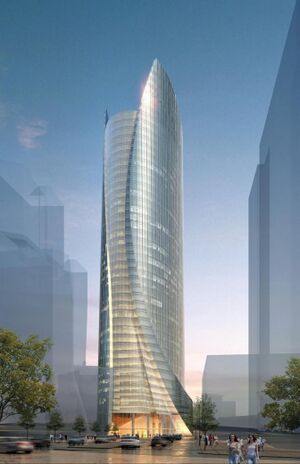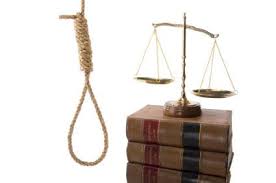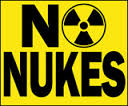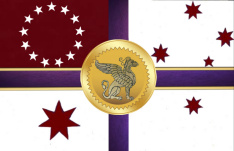West Phoenicia Ministry of Justice: Difference between revisions
(→Courts) |
|||
| (22 intermediate revisions by the same user not shown) | |||
| Line 1: | Line 1: | ||
{{wip}} | {{wip}} | ||
{{Infobox government agency | |||
| name= Ministry of Justice | |||
| native_name = | |||
| native_name_a = | |||
| native_name_r = | |||
| type= Executive Department | |||
| seal = | |||
| seal_width = | |||
| seal_caption = | |||
| logo = | |||
| logo_width = | |||
| logo_caption = | |||
| image = File:WPMinistryJustice.jpg | |||
| image_size = | |||
| image_caption= Justitia Building | |||
| formed={{Start date and age|1970|02|02}} | |||
| preceding1= [[Ministry of Law & Order]] | |||
| preceding2 = <!-- up to |preceding6= --> | |||
| dissolved = | |||
| superseding1 = | |||
| superseding2 = <!-- up to |superseding6= --> | |||
| jurisdiction= [[West Phoenicia|Empire of West Phoenicia]] | |||
| headquarters= Justitia Building<br>[[Melbourne-Haven]]; [[West Phoenicia|Empire of West Phoenicia]] | |||
| coordinates = <!-- {{coord|LATITUDE|LONGITUDE|type:landmark_region:US|display=inline,title}} --> | |||
| motto= Justice for all | |||
| employees= 10,000 | |||
| budget= $1.9 billion | |||
| minister1_name= [[Thuy Swain]] | |||
| minister1_pfo=Attorney-General | |||
| minister2_name= [[Jacob Bain]] | |||
| minister2_pfo = Minister of Justice | |||
| minister3_name=[[Joan Wentworth|Governor Joan Wentworth]] | |||
| minister3_pfo=Minister of Corrective Services | |||
| minister4_name=[[Laura Lamb]] | |||
| minister4_pfo=Minister of Police and Emergency Response | |||
| deputyminister1_name = | |||
| deputyminister1_pfo = | |||
| deputyminister2_name = | |||
| deputyminister2_pfo = <!-- up to |deputyminister8_name= --> | |||
| chief1_name = | |||
| chief1_position = | |||
| chief2_name = | |||
| chief2_position = <!-- up to |chief9_name= --> | |||
| public_protector = | |||
| deputy = | |||
| parent_department = | |||
| parent_agency = | |||
| child1_agency = | |||
| child2_agency = <!-- up to |child25_agency= --> | |||
| keydocument1 = <!-- up to |keydocument6= --> | |||
| website = <!-- {{URL|example.com}} --> | |||
| agency_id = | |||
| map = | |||
| map_size = | |||
| map_caption = | |||
| footnotes = | |||
| embed = | |||
}} | |||
'''The Ministry of Justice''' is the West Phoenician national government executive ministry created with the responsibility for Justice, Corrections and Law and Order. | '''The Ministry of Justice''' is the West Phoenician national government executive ministry created with the responsibility for Justice, Corrections and Law and Order. | ||
==Ministry of Police and Emergency Response== | |||
The | The Ministry of Police and Emergency Response is the West Phoenician government portfolio that is responsible for the development and coordination of law enforcement and Emergency services and enacting emergency management policies. | ||
'''City-states Police Force''' | |||
• Chief Commissioner of the West Phoenician City-State Police Force: Victor Swannie | |||
The | The city-state police forces are responsible for enforcing laws within their own states and jurisdictions with the Chief Commissioner having authority over all city-states. | ||
However, each state has their own Commissioner, the highest-ranking police official. | |||
The | The Minister of Police and Emergency Response allocates funding and resources to each City-state police forces and Emergency services as well as implementing national policy and laws for the city-states to adhere too. | ||
However, each City-state is responsible for maintaining its own police force which is responsible for policing at the state and local level. | |||
This involves general law and order, traffic policing, major crime, anti-terrorism branches, water police and search and rescue. | |||
As of 2019 total number of Uniformed Officers and non uniformed police force members and support staff stands at 300,000. | |||
'''Emergency Services''' | |||
Aside from the City-state Police Forces, the ministry also provides funding, education, policy implementation, and emergency managenment policies to Fire Services West Phoenicia. Ambulance West Phoenicia Ministry for all its emergency medical services and the Coast guard. | |||
However, each city-state needs to maintain its own fire service and ambulance service. | |||
City-State Emergency Service are city-state government-run and offer assistance during and after major incidents. | |||
==Courts== | |||
The Judiciary of West Phoenicia consists of courts and tribunals, composed of judges and justices, who administer justice in the name of West Phoenicia. | |||
The courts and tribunals in West Phoenicia have different procedural powers and characteristics, different jurisdictional limits, different remedial powers and different cost structures. | |||
===Supreme Court=== | ===Supreme Court of West Phoenicia === | ||
The Supreme Court of The | The Supreme Court of The Empire of West Phoenicia is the highest court in West Phoenicia. | ||
It has ultimate appellate jurisdiction over all | It has ultimate appellate jurisdiction over all other courts and over state court cases involving issues of West Phoenicia civil and common law. | ||
In the legal system | In the legal system, the Supreme Court of West Phoenicia is the final interpreter of West Phoenician constitutional law. | ||
The Court consists of the Chief Justice of West Phoenicia and eight associate justices who are nominated by the Prime Minister confirmed by the Senate, the nomination | The Court consists of the Chief Justice of West Phoenicia and eight associate justices who are nominated by the Prime Minister confirmed by the Senate, the nomination isthenn presented to the emperor who hasthe power to veto the nomination. | ||
Once appointed, justices have life tenure unless they resign, retire, take senior status, or are removed after impeachment. | Once appointed, justices have life tenure unless they resign, retire, take senior status, or are removed after impeachment. | ||
| Line 45: | Line 109: | ||
The justices are often categorized as having conservative, moderate, or liberal philosophies of law and of judicial interpretation. | The justices are often categorized as having conservative, moderate, or liberal philosophies of law and of judicial interpretation. | ||
Each justice has one vote, and while many cases are decided unanimously, | Each justice has one vote, and while many cases are decided unanimously, thehighest-profilee cases often expose ideological beliefs that track with those philosophical or political categories. The Court meets in the West Phoenicia Supreme Court Building in Melbourne-Haven, Jackson, West Phoenicia. | ||
Current Justices: | Current Justices: | ||
| Line 60: | Line 124: | ||
===The Inquisition Tribunal:=== | ===The Inquisition Tribunal:=== | ||
The Inquisition Tribunal is the highest religious court in West Phoenicia. | The Inquisition Tribunal is the highest religious court in West Phoenicia.Itss primary cases are against heretics, religious hate groups and prothelyziers. | ||
The Inquisition Tribunal has several different usages; | The Inquisition Tribunal has several different usages; | ||
| Line 76: | Line 140: | ||
The nation’s 53 city-state courts are called Confederate Courts. Confederate courts resolve disputes by determining the facts and applying legal principles to decide who is right in areas of civil and criminal cases. | The nation’s 53 city-state courts are called Confederate Courts. Confederate courts resolve disputes by determining the facts and applying legal principles to decide who is right in areas of civil and criminal cases. | ||
Trial courts include the Confederate judge who tries the case and a jury that decides the case. Magistrate judges assist Confederate judges in preparing cases for trial, they also conduct trials in | Trial courts include the Confederate judge who tries the case and a jury that decides the case. Magistrate judges assist Confederate judges in preparing cases for trial, they also conduct trials in misdemeanour cases. | ||
===Courts of Appeals=== | ===Courts of Appeals=== | ||
| Line 89: | Line 153: | ||
West Phoenicia has 50 Family Courts, a court for each city-state. | West Phoenicia has 50 Family Courts, a court for each city-state. | ||
Family courts hear all cases that relate to familial and domestic relationships. Although each city state has a different system utilized to address family law cases, each city- state strives to provide families with the best possible outcome in family law cases. | Family courts hear all cases that relate to familial and domestic relationships. Although each city-state has a different system utilized to address family law cases, each city- state strives to provide families with the best possible outcome in family law cases. | ||
Family courts can also issue decisions regarding divorce cases | Family courts can also issue decisions regarding divorce cases | ||
| Line 144: | Line 208: | ||
The Animal Justice Court is located in the capital of the city-state of Polytheisa Heaven. | The Animal Justice Court is located in the capital of the city-state of Polytheisa Heaven. | ||
==Prisons in West Phoenicia== | ==Prisons in West Phoenicia== | ||
Latest revision as of 04:27, 30 May 2020
This article is incomplete because it is pending further input from participants, or it is a work-in-progress by one author. Please comment on this article's talk page to share your input, comments and questions. Note: To contribute to this article, you may need to seek help from the author(s) of this page. |
 Justitia Building | |
| Executive Department overview | |
|---|---|
| Formed | February 2, 1970 |
| Preceding Executive Department | |
| Jurisdiction | Empire of West Phoenicia |
| Headquarters | Justitia Building Melbourne-Haven; Empire of West Phoenicia |
| Motto | Justice for all |
| Employees | 10,000 |
| Annual budget | $1.9 billion |
| Ministers responsible |
|
The Ministry of Justice is the West Phoenician national government executive ministry created with the responsibility for Justice, Corrections and Law and Order.
Ministry of Police and Emergency Response
The Ministry of Police and Emergency Response is the West Phoenician government portfolio that is responsible for the development and coordination of law enforcement and Emergency services and enacting emergency management policies.
City-states Police Force
• Chief Commissioner of the West Phoenician City-State Police Force: Victor Swannie
The city-state police forces are responsible for enforcing laws within their own states and jurisdictions with the Chief Commissioner having authority over all city-states. However, each state has their own Commissioner, the highest-ranking police official.
The Minister of Police and Emergency Response allocates funding and resources to each City-state police forces and Emergency services as well as implementing national policy and laws for the city-states to adhere too. However, each City-state is responsible for maintaining its own police force which is responsible for policing at the state and local level. This involves general law and order, traffic policing, major crime, anti-terrorism branches, water police and search and rescue.
As of 2019 total number of Uniformed Officers and non uniformed police force members and support staff stands at 300,000.
Emergency Services
Aside from the City-state Police Forces, the ministry also provides funding, education, policy implementation, and emergency managenment policies to Fire Services West Phoenicia. Ambulance West Phoenicia Ministry for all its emergency medical services and the Coast guard. However, each city-state needs to maintain its own fire service and ambulance service.
City-State Emergency Service are city-state government-run and offer assistance during and after major incidents.
Courts
The Judiciary of West Phoenicia consists of courts and tribunals, composed of judges and justices, who administer justice in the name of West Phoenicia.
The courts and tribunals in West Phoenicia have different procedural powers and characteristics, different jurisdictional limits, different remedial powers and different cost structures.
Supreme Court of West Phoenicia
The Supreme Court of The Empire of West Phoenicia is the highest court in West Phoenicia.
It has ultimate appellate jurisdiction over all other courts and over state court cases involving issues of West Phoenicia civil and common law.
In the legal system, the Supreme Court of West Phoenicia is the final interpreter of West Phoenician constitutional law.
The Court consists of the Chief Justice of West Phoenicia and eight associate justices who are nominated by the Prime Minister confirmed by the Senate, the nomination isthenn presented to the emperor who hasthe power to veto the nomination.
Once appointed, justices have life tenure unless they resign, retire, take senior status, or are removed after impeachment.
The justices are often categorized as having conservative, moderate, or liberal philosophies of law and of judicial interpretation.
Each justice has one vote, and while many cases are decided unanimously, thehighest-profilee cases often expose ideological beliefs that track with those philosophical or political categories. The Court meets in the West Phoenicia Supreme Court Building in Melbourne-Haven, Jackson, West Phoenicia.
Current Justices:
- Chief Justice: Sophia Sinnethopia
- Justice 1: Gaius Gryphon I
- Justice 2: Bradley Curran
- Justice 3: Alan Narrewood
- Justice 4: Thuy Swanston
- Justice 5: Rev Rob Church
- Justice 6: Inga Horne
- Justice 7: Mary Prestonia
- Justice 8: Cate de Vutton
The Inquisition Tribunal:
The Inquisition Tribunal is the highest religious court in West Phoenicia.Itss primary cases are against heretics, religious hate groups and prothelyziers.
The Inquisition Tribunal has several different usages;
An ecclesiastical Tribunal the institution of the Ministry of Faith uses to combat heresy Trial of an individual accused of heresy or religious hate crime
The Inquisition Tribunal has jurisdiction over all citizens except for permanent residents or visitors. The overwhelming majority of sentences consist of penances like attending religious classes, going on pilgrimages etc.
When a suspect is convicted of unrepentant heresy, intolerance or hate the Inquisition tribunal has the power and authority to impose harsher sentences of prison terms, the most extreme being burning at the stake.
The main Inquisition Tribunals courts are located in Agape and Selene Valley.
City State Confederate Courts
The nation’s 53 city-state courts are called Confederate Courts. Confederate courts resolve disputes by determining the facts and applying legal principles to decide who is right in areas of civil and criminal cases.
Trial courts include the Confederate judge who tries the case and a jury that decides the case. Magistrate judges assist Confederate judges in preparing cases for trial, they also conduct trials in misdemeanour cases.
Courts of Appeals
There are 10 appellate courts that sit below the West Phoenician Supreme Court. Split into 10 mega districts that encompass all 53 city-state. The appellate court’s task is to determine whether or not the law was applied correctly in the trial court. Appeals courts consist of three judges and do not use a jury.
A court of appeals hears challenges to district court decisions from courts located within its mega district as well as appeals from decisions of federal administrative agencies.
Family Courts
West Phoenicia has 50 Family Courts, a court for each city-state.
Family courts hear all cases that relate to familial and domestic relationships. Although each city-state has a different system utilized to address family law cases, each city- state strives to provide families with the best possible outcome in family law cases.
Family courts can also issue decisions regarding divorce cases
Military Court of West Phoenicia
Located in Jackson, West Phoenicia.
Its a separate court that deals with the body of laws and procedures governing members of the West Phoenician armed forces.
Legal issues unique to military justice include the preservation of good order and discipline, the legality of orders, and appropriate conduct for members of the military. The Military court also deals with civil offences committed by their armed forces in most circumstances and criminal offences.
Military Legal Advocate Corps is the legal branch or specialty of a military concerned with military justice and military law. Officers serving are typically called Advocates.
Advocates serve primarily as legal advisors to the command to which they are assigned. Their advice may cover a wide range of issues dealing with administrative law, government contracting, civilian and military personnel law, law of war and international relations, environmental law, etc. They also serve as prosecutors for the military when conducting court martial. They are charged with both the defence and prosecution of military law as provided in the West Phoenicia Uniform Code of Military Justice.
West Phoenicia has 10 military prisons that serving personnel can be sentenced to if convicted of a crime.
West Phoenicia International Court of Justice
Located in Free Dixie, the capital city of New Dixie It acts as a separate and independent court and unbiased attitude towards foreign disputes.
The West Phoenicia International Court of Justice settles legal disputes submitted to it by city-states or West Phoenicia as a whole against other nations of the world. Other countries in the world can also raise legal disputes against West Phoenicia.
It also provides advisory opinions on legal questions submitted to it by duly authorized international branches, agencies, and the World Assembly.
Judges serve a time length of 9 years and the number of positions are 11.
The current Chief Justice is: Chief Justice Leopold Dundas II
Drug Courts
West Phoenicia currently has 10 drug courts at city-state levels.
They are problem-solving courts that take a public health approach using a specialized model in which the judiciary,prosecution, defence bar, probation, law enforcement, mental health, social service, and treatment communities work together to help addicted offenders into long-term recovery.
The main aim of the West Phoenician drug courts are to divert illicit drug users from incarceration into treatment programs for their addiction. This is used for first and second time offenders, whearas further offending will see harsher penalties apply.
People's Court
West Phoenicia has People's Courts that are overseen by a Judge.
The People's Court is designed for minor issues like neighbour disputes, traffic disputes, that do not bound on criminal offences and civil disputes for values of less than $300. Decisions are binding. And a number of city-states have taken to broadcasting these court cases on television due to there popularity.
There are currently 15 city-states that have People's Courts.
Animal Justice Court
Located in Melbourne-Haven.
Animal Justice Court resolve disputes by determining the facts and applying legal principles to decide who is right in areas of civil and criminal cases involving animals.
Trial courts include the Animal Justice Court judge who tries the case and passes sentence which can range from fines to prison sentences.
The Animal Justice Court is located in the capital of the city-state of Polytheisa Heaven.
Prisons in West Phoenicia
The Confederate Empire of West Phoenicia believes when someone commits a crime they need to be punished. For worst case offenders Capital Punishment is enforced in most city-states.
Overall West Phoenicia has 380 Prisons;
- Government Run Prisons: 220 in operation
- Private Run Prisons: 70 in operation
- Juvenile Justice Facilities: 80 in operation
- Military Prisons: 10 in operation
Classification:
West Phoenicia classes people as Minimum, Medium and High in regards to risk factor. Minimum classes prisoners are usually sent to Prison Farms or participate in the Volunteer Prison Labor Force.
Medium classed offenders are either sentenced to Medium Security Prisons or also have the ability to sign up to the Volunteer Prison Labor Force.
Prisoners deemed as high classed are imprisoned in Maximum security prisons or Super Max prisons.
Capital Punishment
Capital Punishment has existed in The Confederate Empire of West Phoenicia since the formation of West Phoenicia.
The West Phoenican Congress recently passed the Revised Capital Punishment Act 2018. It passed 1090 to 500 in the House of Representatives, with public support at 80%
The City-states of Agape, Immaculata, Cluella, Debney Bay, Neo Australis and Polytheisa Heaven have all removed the death penalty as an option and have instead instilled a life sentence without parole as an alternative.
Other city-states have capital punishment on their books but rarely enforce it.
However in crimes against West Phoenicia, national law outweighs state laws. So a citizen committing an act in the above city-states can still find them sentenced to death because terrorism is classed as a national crime.
The following crimes fall under the Capital Punishment Act 2016:
1. Murder in the 1st or 2nd degree
2. Drug Trafficking
3. Poaching
4. Assisting in the production of nuclear weapons
5. High Treason
6. Treason
7. Espionage against West Phoenicia
8. Aiding an enemy in time of war
9. First Degree Kidnapping
10. Airplane Hijacking
11. Murder for Hire
12. Rape
13. Terrorism
14. Illegal drug manufacturing
15. Heresy
16. Black Witchcraft
Methods of Capital Punishment.
Each state by law has the right to dictate what method of capital punishment is enforced.
1. Lethal Injection (All city-states)
2. Guillotine (All city-states)
3. Hanging ( All city-states)
4. Firing Squad ( Ptolemaic Haven and New Dixie only)
5. Stoning (New Rome and Testament Valley only)
6. Gas Chamber ( Titania only)
7. Electric Chair ( New Egypt, New Tudor and Upper West Phoenicia)
8. Beheading (Africana Territory, Oceania Territory and Mythologica only)
9. Burnt at the stake ( Assigned by the Inquisition Tribuinal Only)
Laws in West Phoenicia
Volunteer Labor Reform Act 2014
The voluntary labor law is permissible in all city-states except. Polytheisa Heaven, Cluella, Gospela, Druidia, Passions Territory, and Agape who all opted out of the program.
The Volunteer Labor Act was originally designed for convicted criminals whose time whilst imprisoned is used to assist agricultural programs through out the nation.
The Volunteer Labor Act permits people serving prison sentences or Community Service Orders who are classed as Minimum or Medium Security risks are given the opportunity be farmed out to farms and plantations to give back to the nation and enabling the nation of West Phoenicia to prosper economically.
The health and welfare of people serving under these conditions must be maintained. If a prisoner tries to escape they may be whipped by a corrections official or overseer.
An escape attempt will see that prisoner removed from the program and an extra 2 years added to their sentence.
Long term unemployed can find themselves assigned to Volunteer Labor force roles also so they can give back to society while receiving benefits.
Opposition to bill:
The Socialist Party and their left wing allies have strongly condemned The Volunteer Labor Act as cheap gift wrapping disguised as Slavery, instead of a Volunteer project to assist both prisoners, the long term unemployed and the the economy
Plural Marriage Act 2014
West Phoenician Conservative Prime Minister Countess Tia High held a press conference in 2015 for all major WP Broadcasting News stations to announce the passing of the Plural Marriage Act. Reigning monarch Emperor Glenton Bush II never hid the fact of his polygamous lifestyle and upon his coronation his two wives were elevated to the status of queen.
While never illegal, polygamy was predominantly practiced among the wealthy and aristocracy class. With this new law in place it will protect the interest of all classes who choose to embrace plural marriage as an alternative lifestyle and who may have been afraid being a polygamous may have cost them their employment or affect other areas of their or their families lives. A limit of 10 brides per spouse. Women also gained the right to also marry up to three husbands.
With the formation of the Empire. The bill was introduced to parliament for nee approval.
The vote passed Congress.
Let Them Eat Cake Act
In a joint press conference Leaders of the Segregation Party and the West Phoenician Aristocracy Party celebrated the passing of the 'Let them eat cake act' in the city states of New Dixie, Bourbon-Versailles; Antebellum Territory and Olympia Hills who were the first to enact the law in their city-state.
The act will ensure the wealthy and nobility classes are able now allowed by law to have hospitals, cafes, hotels, attend schools and venues exclusively for the upper classes, segregating them from the lower classes.
The act grants venues and places of business the right to refuse entry if one is not of a nobility or wealthy class in special segregated zones.
This law only applies to the city-states above and was passed in Congress; 258 For, 230 against and 12 abstained. Any future city-states needing to pass the bills in their own city-states with support from over 51% of their citizens to implement the law if they desire it.
Since the creation of the bill, The city-states of Immaculata, Titania, Seleucid Dominion, Fantasi, , Mythologica, Nova Texas, Neo Aztecayan Province, Savannah Grove, New Rome, Scarelett Orient Isles, Medevial County, King Glenton Bush I Province, Oceania District, and Brigham Territory have passed the Let them eat cake Act after strong support from The Antebellum Party, The Segregation Party and The Aristocracy Party in those city-states were able to gain large support from their citizens. The city-states of St Mary's and New Tudor have refused to implement the law.
The bill strongly opposes that this is discrimination. Rather it is economic Segregation. People of a lower economic class still have access to hospitals, schools, churches, shops etc. Except in segregated zones.
At the formation of the Empire the bill was reintroduced and passed Congress 1489 to 975.
No Nuke Act
West Phoenicia has voted 1390 to 200enact the No Nuke Act.
West Phoenicia has forbidden the production of nuclear weapons nor export items that could manufacture a Nuclear weapon to other nations. West Phoenicia will be a non nuclear weapon nation for a period of 40 years where after each 20 years it shall be reviewed. Any West Phoenician citizen found assisting in the construction of a nuclear weapon will be sentenced to death. Any non West Phoenician assisting in the construction of a nuclear weapon on West Phoenician soil will be arrested and charged and face a trial where the maximum sentence asked for will be death. West Phoenicia will not trade with a nuke producing or owning nation. West Phoenicia has set up the West Phoenician Non-Proliferation of Nuclear Weapons Committee whose aim is to gather support from other nations in the banning of nuclear weapons.
Protect our Flag Act
In a voted 1200 to 390 enact the Protect our Flag Act enables;
1. The flag is able to be flown on all government buildings, as well as private business and residences. 2. If the flag causes offences that is your problem not the Nation of West Phoenicia and asking for it to be removed is prohibited unless it has been illegally placed on your private property. 3. Anyone caught burning the flag will receive a criminal conviction of 5 years in Prison.
Life begins in the Womb Act
Congress passed the Life begins in the Womb Act 1190 to 400.
The bill affirms that;
1. Life is formed in the womb at Conception.
The bill enables; 2. Criminal convictions for those who injure a woman causing her to lose her baby 3. Criminal convictions for doctors not registered by the Ministry of Health to perform abortions. While abortion is not banned only those medical staff specially registered are allowed to perform abortions under strict conditions. 4. Increased funding allocated to women's health and programs to educate citizens on areas such as abstinence, adoptions and birth control. 5. $6000 baby bonus for women who choose to keep their babies and full financial assistance until the parents are able to return to work. 6. Funding allocated to the creation of additional free child care facilities for middle to low class citizens. Governess educational courses and programs created for low income citizens to work for rich families. 7. Closure of clinics that perform illegal abortions. 8. Free counselling services at all health clinics for parents conflicted within wanting to have an abortion.
Anti-Vaccination Act 2016
With 15% of the population now opposed to vaccinating their children at birth they have pushed for legal recognition to have their rights not to vaccinate protected by law. West Phoenician Congress has discussed this law at length with both pro and anti vaccinators taking the floor to appeal to the senators. After lengthy discussion Congress passed the bill; 1500 For, 900 Against, 64 abstained.
This bill was a conscience vote. Senators did not need to vote along party lines
The Anti Vaccinating Act protects parents who choose not to vaccinate their children on religious, political or other beliefs. The Act protects doctors who support the non-vaccanation of children. The act prohibits the discrimination of anti vaccinators from workplaces, schools, hospitals etc. The Act allows the parents the choice to either choose to vaccinate or non vaccinate. Allows for free discussion and advertising from pro and anti vaccination organisations.
Animal Rights Act 2016
The Animal Justice Party have worked tirelessly to create a bill granting greater rights for animals. Key areas they want to see are the right to life, the protection of individual liberty, and the prohibition of torture.
The act will slowly work to phase out animal testing for cosmetics and other like products while medical testing is exempt with government approval. Harsher sentences for animal abusers. Creation of additional wildlife reserves. Death penalty for poachers, While hunting is exempt the types of animals forbidden from being hunted list has increased. Religious reverance of animals has been noted down with harsh penalties for those who violate the laws or who mistreat animals seen as deities. However religious groups are exempt from the law and animal sacrifice is permissible. The closing down of animal mills, battery hen houses and kill shelters, now instructed to push for greater adoptions or special land set up for animals unable to be adopted out. Protection of animals working in the military or law enforcement. Extra funding allocated to zoos and similar establishments to assist in the welfare of animals. Creation of more zoos and other establishments with breeding programs and back habitat suitable enclosures. Extra money allocated to the Animal Protection Bureau to assist with training officers to assist in the welfare of animals and prosecution of offenders. The formation of an Animal Justice Court set up in Melbourne-Haven to deal with cases involving aninals and animal rights. A list of animals now on the no fur list. Whilst still allowing the fur trade as to not affect the economy but laws in place of the type of animal that can be used for fur.
The West Phoenician Congress passed the Revised Animal Welfare Act 2016, 2
1400 to 190 votes.






